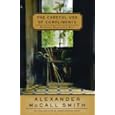
I've written before about my love for all things books, including books about books. So, I thought I would share one book in particular that I enjoy perusing, the Literature Lover's Book of Lists: Serious Trivia for the Bibliophile by Judie L. H. Strouf. The book has all of the lists that you would normally expect in such a book: 'Books for All Ages', 'Genres for Every Taste', 'Poetry..Reflections of the Soul', 'Drama..Thereby Hangs a Tale', 'Themes..Under One Umbrella', and 'Literary Periods'. But by far my favorite part of the book is the section entitled 'Potpourri..Weird, Whimsical, and Worthwhile.' There are 22 different lists in this section, which range from the more mundane ('Book Terminology' and 'Library of Congress Classification') to the fascinating. For example, list number 172 is 'Anonymously Written Books and Current Values.' The books in this list were originally published without the author's name on the title page. And, as you can imagine, these books can be quite valuable if the author went on to become famous. Imagine finding Pride and Prejudice by Jane Austen at a garage sale only to learn that it was a first edition without her name on the title page. Or what if your next thrift store find turned out to be the 1899 anonymous edition of The Importance of Being Earnest by Oscar Wilde? I don't know about you but it certainly makes me want to look a little harder the next time I go to a yard sale. The only thing the book doesn't do is give exact values for all of the books. It simply groups them into four categories from lowest to highest value. However, it isn't hard to find that information. I usually look at Alibris or ABE to find out what particular editions of books are going for at the moment.
Another fascinating list in this section is 'Epitaphs of Authors.' Some of them I've heard before but others were new to me. I was surprised to find that the vast majority of the epitaphs had been written by the author. One of my favorites is by Dorothy Parker, well actually she has two!
1) Excuse my dust; and 2) If you can read this, you've come too close.
Another good one is by Hilaire Belloc, When I am dead, I hope it may be said: His sins were scarlet, but his books were read.
And finally, I'll just do one more -- the "EST" List (oldest, youngest, largest, smallest, etc.).
The oldest complete novel in the world, The Tale of Genji.
The smallest book, Old King Cole (pictured above)
The longest on the N. Y. Times best seller list, The Road Less Traveled by M. Scott Peck
(more than 300 weeks)
There is so much more in this book! I could keep going, but I guess I'll leave some of it in case you want to check this one out for yourself.





 The newly-formed Pfeiffer Student Book Club (we're still trying to decide on a more original name) will meet tomorrow at noon in the Reading Room of the G. A. Pfeiffer Library. We'll be discussing
The newly-formed Pfeiffer Student Book Club (we're still trying to decide on a more original name) will meet tomorrow at noon in the Reading Room of the G. A. Pfeiffer Library. We'll be discussing 








